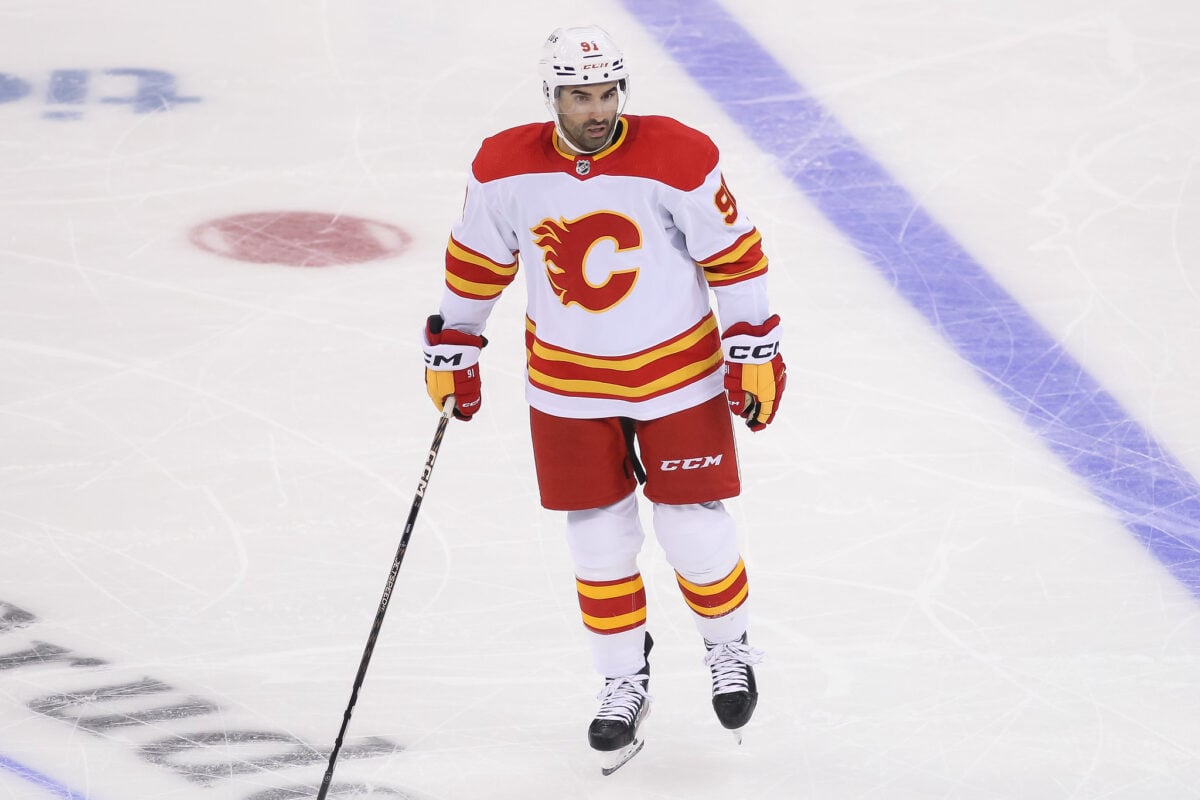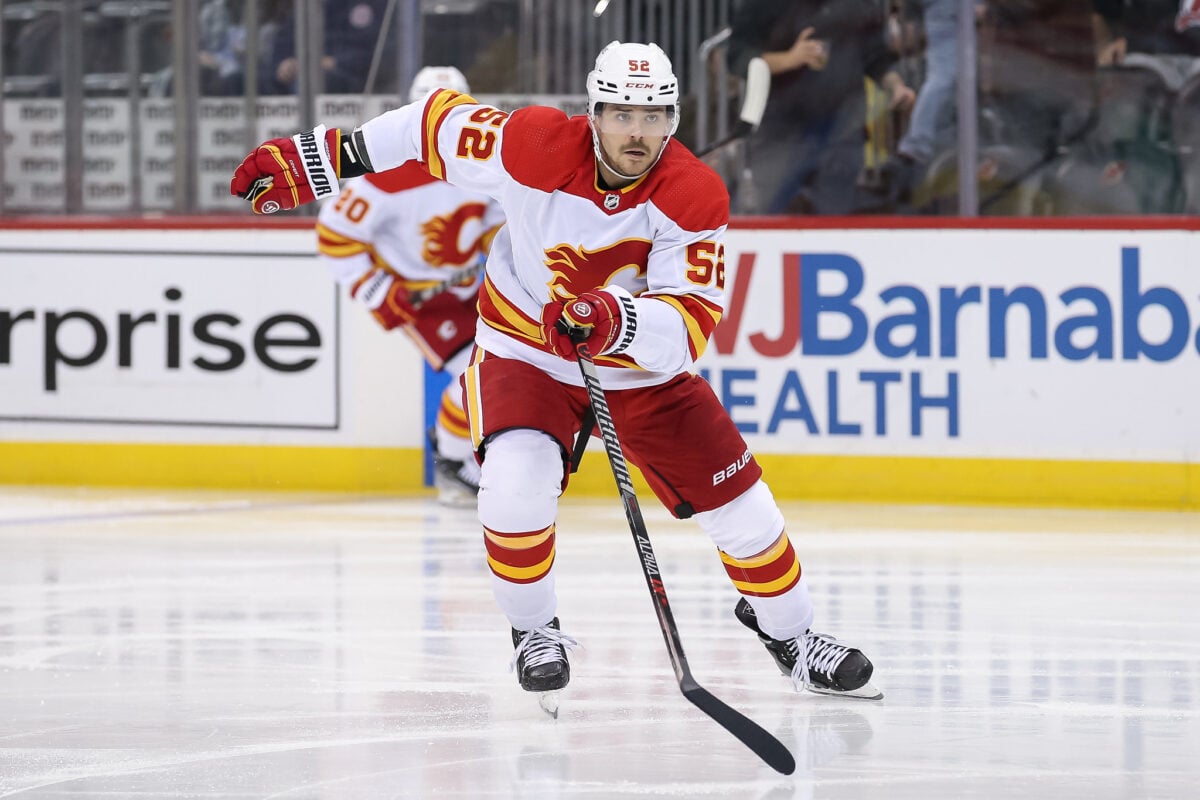What seemed like an amazing response to losing the Calgary Flames’ top two scorers in one offseason has been looking more and more like a disaster in the making. To no fault of his own, Brad Treliving, the general manager (GM) of the Flames, wasn’t able to convince Johnny Gaudreau or Matthew Tkachuk to stick around long term. This led to a couple of big moves that set up the next half a decade for the franchise.
Instead of giving the big money to Gaudreau and Tkachuk, Treliving invested the future of the Flames in a combined $23.75 million into three newly acquired players that will last until the end of 2028-29 when Nazem Kadri’s contract is the first to end. Of the four big and lengthy contracts handed out over the past few years by the Flames’ GM, three of them are already looking like misses. Let’s get into each player.
Jonathan Huberdeau
Starting with the player who will be under contract for the longest as of right now and at the highest average annual value (AAV), Jonathan Huberdeau has started off his tenure with the Flames in the worst possible way. He went from the second-highest scorer in the NHL last season with the high-flying Florida Panthers to 14 points under being a point-per-game player this season with the Flames. He and Darryl Sutter have also been on different pages all season.

You could have made an educated guess that the first season with a new team wouldn’t be as easy on the former Panther, but not to this extent. Before his career year in 2021-22, Huberdeau recorded three consecutive seasons fairly above a point-per-game. He amassed 231 points in 206 games over that span, so finishing last season 35 points over a point-per-game was an outlier. On the other hand, it could have also been seen as a huge, long-awaited breakthrough.
Related: Flames Should Trade Kylington at the Deadline or This Summer
Huberdeau scored 30 goals and recorded 85 assists last season. Thirty goals tied his career high, but 85 far surpassed his previous career high of 62 set in 2018-19. In a new system with new linemates, the expectation was that he could at least maintain a point-per-game pace while getting better defensively for Sutter. Huberdeau is still being paid $5.9 million this season before his eight-year, $10.5 million AAV extension kicks in. So, 10 goals and 33 points in 47 games isn’t horrible for his current salary, but will be a major disaster if his salary doubles and his production remains the same.
Nazem Kadri
Next up is the Flames’ big free-agent signing, Kadri. With Mikael Backlund getting older and two big contributors off of the team, Kadri was supposed to provide the team with great play at both ends of the ice from the second line. As intended, Backlund has been successful in a third-line role, but expectations were too high for Kadri. He is a top-six centre, don’t get me wrong, but he hasn’t provided quite enough.
Kadri may be heading to the All-Star Game, but whether he is the most deserving member of the Flames is debatable. He also happens to lead the team in goals with 19, but that’s not a huge accomplishment considering the team is without a 20-goal scorer. Kadri’s contract isn’t looking nearly as bad as Huberdeau’s, but it won’t get any better than it is. Kadri has six more seasons left on his deal at $7 million AAV as opposed to eight more years at $10.5 million AAV.

He is on pace to finish just under his career high of 32 goals and right around his offensive production during the 2016-17 and 2017-18 seasons with the Toronto Maple Leafs (around 60 points). There was a highly unlikely chance he was going to replicate 87 points in 71 games from last season and $7 million AAV may not look great in a few seasons if the Flames are still Stanley Cup contenders.
Jacob Markstrom
Someone who I have yet to discuss is goaltender Jacob Markstrom. He is in the midst of the worst season of his career. He posts a 13-13-5 record with a 2.86 goals-against average (GAA) and .893 save percentage (SV%). He also sits at minus-10.6 goals saved above average (GSAA), by far the worst in his career. He has yet to record a shutout this season after having seven through the same amount of starts last season.
Since joining the Flames, Markstrom has had two unimpressive seasons and one very impressive one. I recently wrote an article on how he has actually hurt the Flames more than he has helped them since coming over from Vancouver. When he signed in the 2020 offseason, he was given a six-year, $6 million contract. That’s fairly high for a goaltender considering there are only five goalies with a higher cap hit and all have accomplished more in their careers than Markstrom.
Dan Vladar wasn’t in the picture at the time of the Markstrom signing, so it appeared like the right move. Vladar has played much better than the Flames’ starter, is earning $750,000 this season, and is nearly a third of Markstrom’s cap hit for two more seasons. With Dustin Wolf looking like the next franchise goalie, the Flames are stuck with Markstrom’s poor play and high cap hit for three more seasons unless they do something about it.
MacKenzie Weegar
MacKenzie Weegar is still on a very affordable and great contract until the end of the season. He has a cap hit of just $3.25 million AAV until his eight-year, $6.25 million AAV contract kicks in next season. This is still very reasonable for the work that he has put in for the Panthers, as well as the type of player he is, and should remain, for the Flames.

With defencemen like Weegar, points are not the main concern, which also means his defending is more valued. Per Natural Stat Trick, he has been very strong for the most part with his two main defensive partners this season at 5-on-5. Alongside Chris Tanev, who he’s spent 472 minutes with, they have a 56.19 expected goals for percentage (xGF%), but only have a goals for percentage (GF%) of 43.24. With them on the ice, the team is expected to have scored 22 goals and allowed 17. Instead, the team has scored 16 and allowed 22. A lot of this is out of this pairing’s hands.
As for Weegar’s other partner, Nikita Zadorov, whom he’s currently playing beside, they have a great xGF% and GF% in 275 minutes spent on the ice together. Their xGF% is 55.35 and their xGF% is 57.89. Weegar is also fully capable of turning up the offensive side of his game if needed, seeing as he did so for parts of the last two seasons with Florida and earned Norris Trophy votes.
Overall, Treliving did the best he could in a bad situation, but it isn’t looking so hot right now or for the future. It could mean an end to a strong team without a Stanley Cup, similar to how the San Jose Sharks have been dismantled, or the Flames on big contracts can step up. Treliving must learn from the contracts he handed out, but he also likely won’t be in a similar position to this past summer again either.